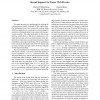Free Online Productivity Tools
i2Speak
i2Symbol
i2OCR
iTex2Img
iWeb2Print
iWeb2Shot
i2Type
iPdf2Split
iPdf2Merge
i2Bopomofo
i2Arabic
i2Style
i2Image
i2PDF
iLatex2Rtf
Sci2ools
102
click to vote
USENIX
2003
2003
Kernel Support for Faster Web Proxies
This paper proposes two mechanisms for reducing the communication-related overheads of Web applications. One mechanism is user-level connection tracking, which allows an application to coordinate its non-blocking I/O operations with significantly fewer system calls than previously possible. The other mechanism is data-stream splicing, which allows a Web proxy application to forward data between server and client streams in the kernel with no restrictions on connection persistency, object cacheability, and request pipelining. These mechanisms remove elements that scale poorly with CPU speed, such as context switches and data copies, from the code path of Web-request handling. The two mechanisms are implemented as Linux loadable kernel modules. User-level connection tracking is used to implement uselect, a user-level select API. The Squid Web proxy and the Polygraph benchmarking tool are used in the evaluation. With Polymix-4, a realistic forward proxy workload biased towards cache hit...
Mechanisms Remove Elements | Operating System | USENIX 2003 | User-level Connection Tracking | Web Proxy |
| Added | 01 Nov 2010 |
| Updated | 01 Nov 2010 |
| Type | Conference |
| Year | 2003 |
| Where | USENIX |
| Authors | Marcel-Catalin Rosu, Daniela Rosu |
Comments (0)

